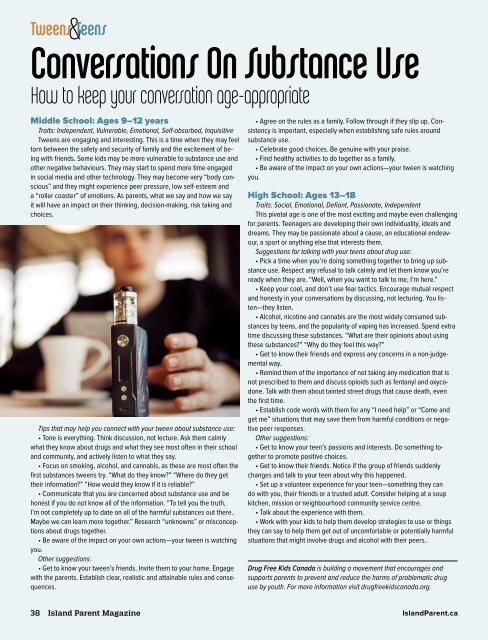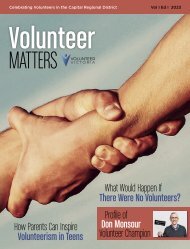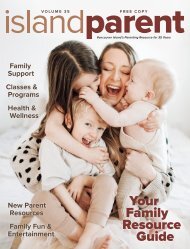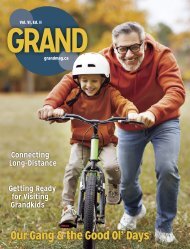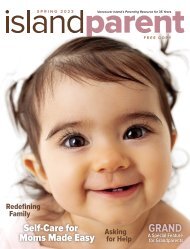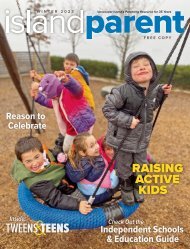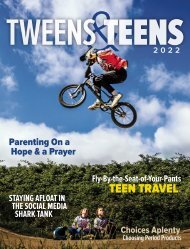Island Parent Pre-Summer 2023
Vancouver Island’s Parenting Resource for 35 Years • Explore the Island: A Region-by-Region Guide • Road Trip Food • Things to Do in June & July • Play On: Outdoor Games for Families • Seas, Trees & a Gentle Breeze • Tweens & Teens
Vancouver Island’s Parenting Resource for 35 Years • Explore the Island: A Region-by-Region Guide • Road Trip Food • Things to Do in June & July • Play On: Outdoor Games for Families • Seas, Trees & a Gentle Breeze • Tweens & Teens
You also want an ePaper? Increase the reach of your titles
YUMPU automatically turns print PDFs into web optimized ePapers that Google loves.
Conversations On Substance Use<br />
How to keep your conversation age-appropriate<br />
Middle School: Ages 9–12 years<br />
Traits: Independent, Vulnerable, Emotional, Self-absorbed, Inquisitive<br />
Tweens are engaging and interesting. This is a time when they may feel<br />
torn between the safety and security of family and the excitement of being<br />
with friends. Some kids may be more vulnerable to substance use and<br />
other negative behaviours. They may start to spend more time engaged<br />
in social media and other technology. They may become very “body conscious”<br />
and they might experience peer pressure, low self-esteem and<br />
a “roller coaster” of emotions. As parents, what we say and how we say<br />
it will have an impact on their thinking, decision-making, risk taking and<br />
choices.<br />
Tips that may help you connect with your tween about substance use:<br />
• Tone is everything. Think discussion, not lecture. Ask them calmly<br />
what they know about drugs and what they see most often in their school<br />
and community, and actively listen to what they say.<br />
• Focus on smoking, alcohol, and cannabis, as these are most often the<br />
first substances tweens try. “What do they know?” “Where do they get<br />
their information?” “How would they know if it is reliable?”<br />
• Communicate that you are concerned about substance use and be<br />
honest if you do not know all of the information. “To tell you the truth,<br />
I’m not completely up to date on all of the harmful substances out there.<br />
Maybe we can learn more together.” Research “unknowns” or misconceptions<br />
about drugs together.<br />
• Be aware of the impact on your own actions—your tween is watching<br />
you.<br />
Other suggestions:<br />
• Get to know your tween’s friends. Invite them to your home. Engage<br />
with the parents. Establish clear, realistic and attainable rules and consequences.<br />
• Agree on the rules as a family. Follow through if they slip up. Consistency<br />
is important, especially when establishing safe rules around<br />
substance use.<br />
• Celebrate good choices. Be genuine with your praise.<br />
• Find healthy activities to do together as a family.<br />
• Be aware of the impact on your own actions—your tween is watching<br />
you.<br />
High School: Ages 13–18<br />
Traits: Social, Emotional, Defiant, Passionate, Independent<br />
This pivotal age is one of the most exciting and maybe even challenging<br />
for parents. Teenagers are developing their own individuality, ideals and<br />
dreams. They may be passionate about a cause, an educational endeavour,<br />
a sport or anything else that interests them.<br />
Suggestions for talking with your teens about drug use:<br />
• Pick a time when you’re doing something together to bring up substance<br />
use. Respect any refusal to talk calmly and let them know you’re<br />
ready when they are. “Well, when you want to talk to me, I’m here.”<br />
• Keep your cool, and don’t use fear tactics. Encourage mutual respect<br />
and honesty in your conversations by discussing, not lecturing. You listen—they<br />
listen.<br />
• Alcohol, nicotine and cannabis are the most widely consumed substances<br />
by teens, and the popularity of vaping has increased. Spend extra<br />
time discussing these substances. “What are their opinions about using<br />
these substances?” “Why do they feel this way?”<br />
• Get to know their friends and express any concerns in a non-judgemental<br />
way.<br />
• Remind them of the importance of not taking any medication that is<br />
not prescribed to them and discuss opioids such as fentanyl and oxycodone.<br />
Talk with them about tainted street drugs that cause death, even<br />
the first time.<br />
• Establish code words with them for any “I need help” or “Come and<br />
get me” situations that may save them from harmful conditions or negative<br />
peer responses.<br />
Other suggestions:<br />
• Get to know your teen’s passions and interests. Do something together<br />
to promote positive choices.<br />
• Get to know their friends. Notice if the group of friends suddenly<br />
changes and talk to your teen about why this happened.<br />
• Set up a volunteer experience for your teen—something they can<br />
do with you, their friends or a trusted adult. Consider helping at a soup<br />
kitchen, mission or neighbourhood community service centre.<br />
• Talk about the experience with them.<br />
• Work with your kids to help them develop strategies to use or things<br />
they can say to help them get out of uncomfortable or potentially harmful<br />
situations that might involve drugs and alcohol with their peers.<br />
Drug Free Kids Canada is building a movement that encourages and<br />
supports parents to prevent and reduce the harms of problematic drug<br />
use by youth. For more information visit drugfreekidscanada.org.<br />
38 <strong>Island</strong> <strong>Parent</strong> Magazine <strong>Island</strong><strong>Parent</strong>.ca


